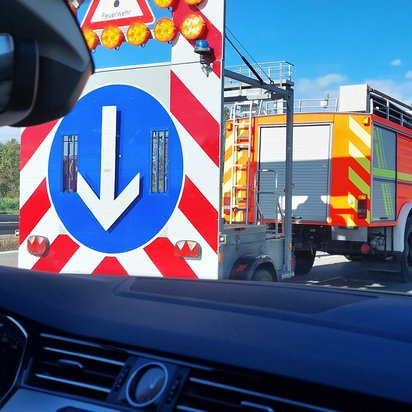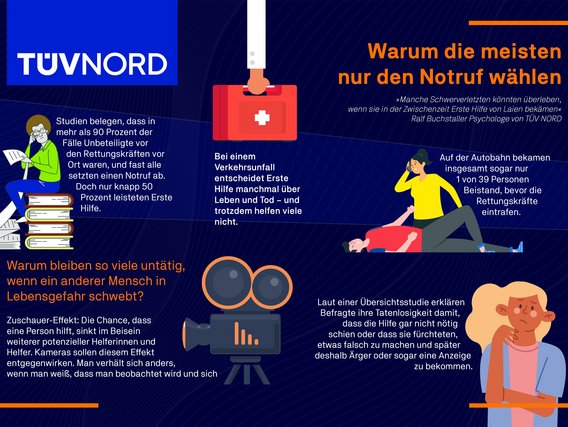Warum die meisten nur den Notruf wählen
People & Empowerment: Bei einem Verkehrsunfall entscheidet Erste Hilfe manchmal über Leben und Tod – und trotzdem helfen viele nicht.

People & Empowerment: Bei einem Verkehrsunfall entscheidet Erste Hilfe manchmal über Leben und Tod – und trotzdem helfen viele nicht.

Time and again, people die in road traffic accidents because emergency services are not on the scene quickly enough. “Some seriously injured people could survive if they received first aid from lay people in the meantime,” says Ralf Buchstaller from the Medical-Psychological Institute of TÜV NORD in Hamburg. But all too often this help is not forthcoming. “Most people who happen to pass by an accident only dial the emergency number.”
This is one of the conclusions of a study by the University of Manchester. The study examined mainly accidental deaths in which the victims had a reasonable chance of survival but died before arriving at hospital. In more than 90 percent of cases, bystanders were on the scene before the emergency services, and almost all of them made an emergency call. However, only just under 50 percent provided first aid.
On the highway, the chances are particularly poor, as US data from almost two million medical emergencies on public roads showed. The researchers from Cornell University reported that, overall, only 1 in 39 people received assistance before the emergency services arrived.

Why do so many people remain inactive when another person's life is in danger?
Research into this question began with the case of Kitty Genovese: The young woman was murdered near her apartment in New York in 1964, while numerous neighbors heard her scream. Researchers dubbed the phenomenon the “bystander effect”: according to this, the chance that a person will help decreases in the presence of other potential helpers. On the one hand, many people prefer to wait and see if someone else does something, especially in cases where the emergency situation is unclear. Secondly, the responsibility is spread across several shoulders, according to the motto: why me - the others could help too. Cameras counteract the bystander effect, Dutch researchers found.
For their experiment, they staged a theft in such a way that their test subjects could observe it seemingly by chance. If the test subject was in the company of two other people at this moment, they were less likely to intervene than if they were alone. However, the probability of intervention increased if a security camera was filming the event. “We behave differently when we know that we are being watched and may have to justify our inaction,” explains Ralf Buchstaller, a psychologist with a doctorate from TÜV NORD.
Helping fellow human beings in acute need is a civic duty. Anyone who is not aware of this should at least act out of compassion. So is callousness to blame for refusing help? According to a survey, respondents explain their inaction more by the fact that the help did not seem necessary or that they were afraid of doing something wrong and getting into trouble or even being reported to the police later.
A first aid course can change this. It not only promotes competence, but also the willingness to stop and help in the event of an accident. For example, the one-hour “Stop the bleed” course from the US campaign of the same name: it is designed to teach laypeople how to stop bleeding. According to the initiative, bleeding to death is one of the main causes of people succumbing to their injuries after an accident - on average within three to five minutes. Paramedics are not usually on the scene that quickly. The only hope for these injured people is that someone will take heart before then.
“Failure to render assistance is punishable, provided that the assistance is reasonable”, reminds Ralf Buchstaller from TÜV NORD. A non-swimmer, for example, does not have to jump into the water to help a drowning person. But being in a hurry is not considered an obstacle. Neither is the fear of doing something wrong when helping: “If the help causes physical harm, the person helping does not face any punishment as long as they have acted to the best of their knowledge and not intentionally or through gross negligence,” explains Buchstaller. Important: To protect everyone involved, you should first secure the scene of the accident before calling the emergency services and providing first aid.
Regardless of whether the victim survives or all help comes too late: such an experience is not easy to come to terms with. Anyone who wants to talk about it will find a sympathetic ear around the clock at the telephone helpline. If the experience has left a lasting mark on the psyche, further professional help is needed. “For some people, the experience leaves a deep impression, they can't forget the images of an accident,” reports the psychologist. “It's nothing to be ashamed of.” Talking to your family doctor can be the first step, and in urgent cases you should visit the psychiatric outpatient clinics of hospitals, advises Buchstaller. “Provide help, seek help: Both are part of life.”
Founded over 150 years ago, we stand for security and trust worldwide. As a knowledge company, we have our sights firmly set on the digital future. Whether engineers, IT security experts or specialists for the mobility of the future: in more than 100 countries, we ensure that our customers become even more successful in the networked world.